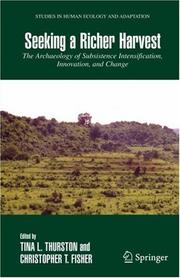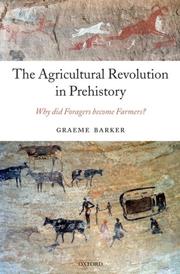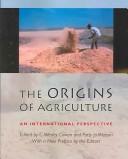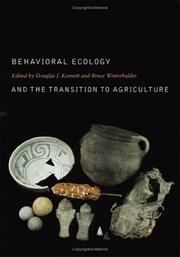| Listing 1 - 5 of 5 |
Sort by
|

ISBN: 1280724323 9786610724321 0387327622 0387327614 Year: 2006 Publisher: New York : Springer,
Abstract | Keywords | Export | Availability | Bookmark
 Loading...
Loading...Choose an application
- Reference Manager
- EndNote
- RefWorks (Direct export to RefWorks)
Subsistence intensification, innovation and change have long figured prominently in explanations for the development of social complexity among foragers and horticulturalists, and the rise of chiefly societies and archaic states, yet there is considerable debate over the actual mechanisms that promote these processes. Traditional approaches to the "intensification question" emphasize population pressure, climate change, bureaucratic management, or even land degradation as prerequisites for the onset of new or changing strategies, or the construction and maintenance of agricultural landscapes. Most often these factors are modeled as external forces outside the realm of human decision-making, but recent archaeological research presents an alternative to this suggesting that subsistence intensification is the result of human driven strategies for power, prestige and status stemming from internal conditions within a group. When responding to environmental adversity, human groups were less frequently the victims, as they have been repeatedly portrayed. Instead human groups were often vigorous actors, responding with resilience, ingenuity, and planning, to flourish or survive within dynamic and sometimes unpredictable social and natural milieux.
Agricultural intensification --- Agriculture, Prehistoric. --- Agriculture, Ancient. --- Indians --- History. --- Agriculture. --- Ancient agriculture --- Prehistoric agriculture --- Prehistoric peoples --- Intensification of agriculture --- Agriculture --- Food --- Anthropology. --- Archaeology. --- Ecology. --- Community & Population Ecology. --- Balance of nature --- Biology --- Bionomics --- Ecological processes --- Ecological science --- Ecological sciences --- Environment --- Environmental biology --- Oecology --- Environmental sciences --- Population biology --- Archeology --- Anthropology --- Auxiliary sciences of history --- History --- Antiquities --- Human beings --- Ecology --- Community ecology, Biotic. --- Biocenoses --- Biocoenoses --- Biogeoecology --- Biological communities --- Biomes --- Biotic community ecology --- Communities, Biotic --- Community ecology, Biotic --- Ecological communities --- Ecosystems --- Natural communities --- Primitive societies --- Social sciences

ISBN: 0191917656 1282235001 9786612235009 0191557668 9780191557668 0199281092 9780199281091 9780199559954 6612235004 9780191917653 Year: 2006 Publisher: Oxford New York Oxford University Press
Abstract | Keywords | Export | Availability | Bookmark
 Loading...
Loading...Choose an application
- Reference Manager
- EndNote
- RefWorks (Direct export to RefWorks)
Addressing one of the most debated revolutions in the history of our species, the change from hunting and gathering to farming, this title takes a global view, and integrates an array of information from archaeology and many other disciplines, including anthropology, botany, climatology, genetics, linguistics, and zoology.
Agriculture, Prehistoric. --- Agriculture --- Plants, Cultivated --- Plant remains (Archaeology) --- Archaeobotanical assemblages --- Archaeobotanical material --- Archaeobotanical remains --- Archaeobotany --- Archaeological plant remains --- Archaeology, Botanical --- Assemblages, Archaeobotanical --- Botanical archaeology --- Botany in archaeology --- Material, Archaeobotanical --- Phytoarchaeology --- Remains, Archaeobotanical --- Remains, Plant (Archaeology) --- Remains, Vegetal (Archaeology) --- Vegetal remains (Archaeology) --- Archaeology --- Paleobotany --- Anthracology --- Origin of cultivated plants --- Origin of agriculture --- Agriculture, Prehistoric --- Domestication --- Prehistoric agriculture --- Prehistoric peoples --- Origin. --- Methodology --- History --- Food --- Hunting and gathering societies. --- Food gathering societies --- Gathering and hunting societies --- Hunter-gatherers --- Hunting, Primitive --- Ethnology --- Subsistence hunting --- Plant remains (Archaeology).

ISBN: 9780817382704 0817382704 0817353496 9780817353490 Year: 2006 Publisher: Tuscaloosa : University of Alabama Press,
Abstract | Keywords | Export | Availability | Bookmark
 Loading...
Loading...Choose an application
- Reference Manager
- EndNote
- RefWorks (Direct export to RefWorks)
The eight case studies in this book -- each a synthesis of available knowledge about the origins of agriculture in a specific region of the globe -- enable scholars in diverse disciplines to examine humanity's transition to agricultural societies. Contributors include: Gary W. Crawford, Robin W. Dennell, and Jack R. Harlan.
Plant remains (Archaeology) --- Prehistoric peoples --- Agriculture, Prehistoric --- Agriculture --- Archaeobotanical assemblages --- Archaeobotanical material --- Archaeobotanical remains --- Archaeobotany --- Archaeological plant remains --- Archaeology, Botanical --- Assemblages, Archaeobotanical --- Botanical archaeology --- Botany in archaeology --- Material, Archaeobotanical --- Phytoarchaeology --- Remains, Archaeobotanical --- Remains, Plant (Archaeology) --- Remains, Vegetal (Archaeology) --- Vegetal remains (Archaeology) --- Archaeology --- Paleobotany --- Anthracology --- Cavemen (Prehistoric peoples) --- Early man --- Man, Prehistoric --- Prehistoric archaeology --- Prehistoric human beings --- Prehistoric humans --- Prehistory --- Human beings --- Antiquities, Prehistoric --- Prehistoric agriculture --- Farming --- Husbandry --- Industrial arts --- Life sciences --- Food supply --- Land use, Rural --- Food --- Origin --- Methodology --- Primitive societies

ISBN: 0199281092 9780199281091 Year: 2006 Publisher: Oxford Oxford University Press
Abstract | Keywords | Export | Availability | Bookmark
 Loading...
Loading...Choose an application
- Reference Manager
- EndNote
- RefWorks (Direct export to RefWorks)
The Agricultural Revolution in Prehistory addresses one of the most debated and least understood revolutions in the history of our species, the change from hunting and gathering to farming. Graeme Barker takes a global view, and integrates a massive array of information from archaeology and many other disciplines, including anthropology, botany, climatology, genetics, linguistics, and zoology. Against current orthodoxy, Barker develops a strong case for the development of agricultural systems in many areas as transformations in the life-ways of the indigenous forager societies, and argues that these were as much changes in social norms and ideologies as in ways of obtaining food. With a large number of helpful line drawings and photographs as well as a comprehensive bibliography, this authoritative study will appeal to a wide general readership as well as to specialists in a variety of fields.
Social change --- Prehistory --- Agriculture, Prehistoric. --- Agriculture --- Plants, Cultivated --- Plant remains (Archaeology) --- Agriculture préhistorique --- Plantes cultivées --- Restes de plantes (Archéologie) --- Origin. --- Origines --- Plant remains (Archaeology). --- Agriculture préhistorique --- Plantes cultivées --- Restes de plantes (Archéologie) --- Agriculture, Prehistoric --- Origin of cultivated plants --- Archaeobotanical assemblages --- Archaeobotanical material --- Archaeobotanical remains --- Archaeobotany --- Archaeological plant remains --- Archaeology, Botanical --- Assemblages, Archaeobotanical --- Botanical archaeology --- Botany in archaeology --- Material, Archaeobotanical --- Phytoarchaeology --- Remains, Archaeobotanical --- Remains, Plant (Archaeology) --- Remains, Vegetal (Archaeology) --- Vegetal remains (Archaeology) --- Origin of agriculture --- Prehistoric agriculture --- Prehistoric peoples --- Origin --- Archaeology --- Paleobotany --- Anthracology --- Domestication --- Methodology --- History --- Food

ISBN: 1282759434 9786612759437 0520932455 1598759175 9780520932456 1423752686 9781423752684 9781598759174 9780520246478 0520246470 9781282759435 Year: 2006 Publisher: Berkeley University of California Press
Abstract | Keywords | Export | Availability | Bookmark
 Loading...
Loading...Choose an application
- Reference Manager
- EndNote
- RefWorks (Direct export to RefWorks)
This innovative volume is the first collective effort by archaeologists and ethnographers to use concepts and models from human behavioral ecology to explore one of the most consequential transitions in human history: the origins of agriculture. Carefully balancing theory and detailed empirical study, and drawing from a series of ethnographic and archaeological case studies from eleven locations-including North and South America, Mesoamerica, Europe, the Near East, Africa, and the Pacific-the contributors to this volume examine the transition from hunting and gathering to farming and herding using a broad set of analytical models and concepts. These include diet breadth, central place foraging, ideal free distribution, discounting, risk sensitivity, population ecology, and costly signaling. An introductory chapter both charts the basics of the theory and notes areas of rapid advance in our understanding of how human subsistence systems evolve. Two concluding chapters by senior archaeologists reflect on the potential for human behavioral ecology to explain domestication and the transition from foraging to farming.
Human evolution. --- Human ecology. --- Human behavior. --- Agriculture, Prehistoric. --- Agriculture --- Evolution (Biology) --- Physical anthropology --- Evolutionary psychology --- Human beings --- Ecology --- Environment, Human --- Human environment --- Ecological engineering --- Human geography --- Nature --- Action, Human --- Behavior, Human --- Ethology --- Human action --- Human biology --- Psychology --- Social sciences --- Psychology, Comparative --- Prehistoric agriculture --- Prehistoric peoples --- Origin of agriculture --- Agriculture, Prehistoric --- Domestication --- Origin. --- Origin --- Social aspects --- Effect of environment on --- Effect of human beings on --- Behavior --- Food --- History --- agriculture. --- andes. --- animal domestication. --- arabia. --- archaeology. --- arizona. --- cumberland. --- domestic animals. --- early civilization. --- ecology. --- environment. --- food production. --- foraging. --- fremont. --- hbe. --- highlands. --- history. --- human behavior. --- human behavioral ecology. --- hunting and gathering. --- indigenous culture. --- indigenous people. --- land use. --- madagascar. --- maize. --- mikea. --- neotropics. --- new guinea. --- nonfiction. --- oceania. --- pacific coast. --- plant domestication. --- rain barrier. --- science. --- valencia. --- wild animals.
| Listing 1 - 5 of 5 |
Sort by
|

 Search
Search Feedback
Feedback About UniCat
About UniCat  Help
Help News
News